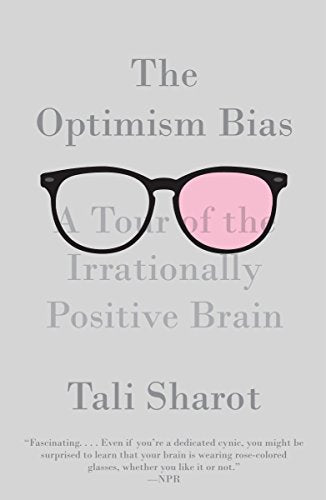Bargain Bin Books
The Optimism Bias: A Tour of the Irrationally Positive Brain
Couldn't load pickup availability
Author: Sharot, Tali
Color: Silver
Edition: Reprint
Number Of Pages: 272
Details:
Psychologists have long been aware that most people maintain an irrationally positive outlook on life—but why? Turns out, we might be hardwired that way. In this absorbing exploration, Tali Sharot—one of the most innovative neuroscientists at work today—demonstrates that optimism may be crucial to human existence. The Optimism Bias explores how the brain generates hope and what happens when it fails; how the brains of optimists and pessimists differ; why we are terrible at predicting what will make us happy; how emotions strengthen our ability to recollect; how anticipation and dread affect us; how our optimistic illusions affect our financial, professional, and emotional decisions; and more. Drawing on cutting-edge science, The Optimism Bias provides us with startling new insight into the workings of the brain and the major role that optimism plays in determining how we live our lives.
Reviews:
“Fascinating. . . . Even if you’re a dedicated cynic, you might be surprised to learn that your brain is wearing rose-colored glasses, whether you like it or not.”—NPR“What a treat. A charming, engaging and accessible book written by a scientist who knows how to tell a story.”—Richard Thaler, author of Nudge“An insightful, Oliver Sacks-y first book.”—The Village Voice“Very enjoyable, highly original and packed with eye-opening insight, this is a beautifully written book that really brings psychology alive.”—Simon Baron-Cohen, author of The Science of Evil
“Offers evolutionary, neurological, and even slightly philosophical reasons for optimism. . . . A book I’d suggest to anyone.”—Terry Waghorn, Forbes
“If you read her story, you’ll get a better grip on how we function in it. I’m optimistic about that.”—Richard Stengel, Time
“Once I started reading The Optimism Bias, I could not put it down.”—Louisa Jewell, Positive Psychology News Daily
“An intelligently written look into why most people take an optimistic view of life. . . . [A] fascinating trip into why we prefer to remain hopeful about our future and ourselves.”—New York Journal of Books
“With rare talent Sharot takes us on an unforgettable tour of the hopes, traps and tricks of our brains. . . . A must-read.”—David Eagleman, author of Incognito
“A fascinating yet accessible exploration of how and why our brains construct a positive outlook on life.”—BrainPickings.org
“Lively, conversational. . . . A well-told, heartening report from neuroscience’s front lines.”—Kirkus Reviews
“Most readers will turn to the last page not only buoyed by hope but also aware of the sources and benefits of that hope.”—Booklist
“Fascinating and fun to read. . . . Provides lucid accounts of [Sharot’s] often ingenious experiments.”—BBC Focus Magazine
About the Author:
Tali Sharot’s research on optimism, memory, and emotion has been the subject of features in Newsweek, The Boston Globe, Time, The Wall Street Journal, New Scientist, and The Washington Post, as well as on the BBC. She has a Ph.D. in psychology and neuroscience from New York University and is the director of the Affective Brain Lab and an Associate Professor of Cognitive Neuroscience in the department of Experimental Psychology at University College London. She lives in London. Excerpt. © Reprinted by permission. All rights reserved. Table of ContentsPrologue: A Glass Forever Half Full? 1. Which Way Is Up? Illusions of the Human Brain 2. Are Animals Stuck in Time? The Evolution of Prospection 3. Is Optimism a Self- Fulfi lling Prophecy? How the Mind Transforms Predictions into Reality 4. What Do Barack Obama and Shirley Temple Have in Common? When Private Optimism Meets Public Despair 5. Can You Predict What Will Make You Happy? The Unexpected Ingredient for Well- being 6. Crocuses Popping Up Through the Snow? When Things Go Wrong: Depression, Interpretation,and Genes 7. Why Is Friday Better Than Sunday? The Value of Anticipation and the Cost of Dread 8. Why Do Things Seem Better A...
EAN: 9780307473516
Release Date: 12-06-2012
Languages: English
Item Note: Good shape with typical wear. Has a remainder mark. Paperback Used - Very Good Ships fast! 2012Reprint
Item Condition: UsedVeryGood
Binding: Paperback
Share


